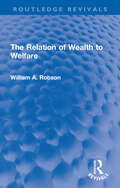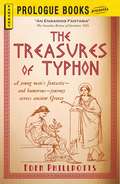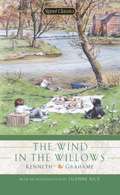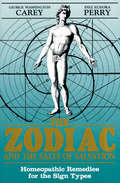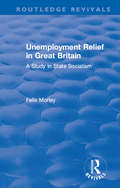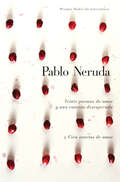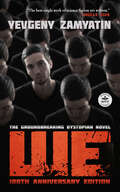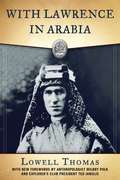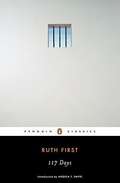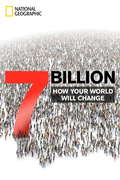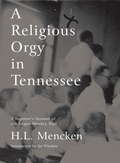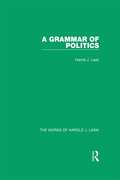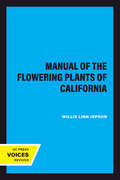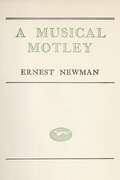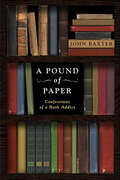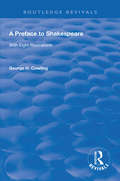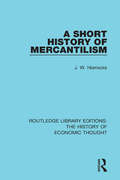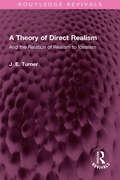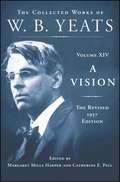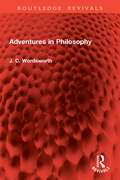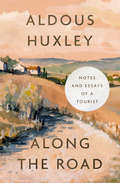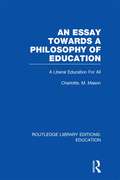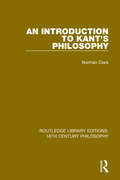- Table View
- List View
The Relation of Wealth to Welfare (Routledge Revivals)
by William A. RobsonFirst Published in 1924, The Relation of Wealth to Welfare examines certain definite and fundamental elements of human welfare and their relation to private income on the one hand and various kinds of collective action on the other. The four elements discussed in the book are health, art, work, and education. The author argues that the power of private income to increase the welfare of its possessor in regard to the various elements under examination is as a matter of fact frequently or even always comparatively small; whereas the power of collective action and public expenditure to do so is often comparatively great. This book is an essential read for students and researchers of political economy, political studies, and economics in general.
The Treasures of Typhon (Prologue Fantasy)
by Eden PhillpottsSulky and obstinate, Typhon is not the son his well-to-do Athenian parents think he should be. Not knowing what else to do, they reach out to their friends Epicurus and Menander, the great Hellenic philosophers of old. The philosophers’ diagnosis: adventure. Gifting Typhon with the ability to speak to plants, they send him across ancient Greece to discover what he can about life and love. But while he’s soaking in arboreal wisdom, Typhon embarks on the greatest adventure of adolescence: love.“The book has an undeniable charm.”-The Saturday Review, 1925Eden Phillpotts was born in India in 1862, but hailed from the United Kingdom from his early childhood forward. Known as a prolific young adult and mystery novelist, he penned about 250 works in his lifetime, including The Farmer’s Wife, a comic play which Alfred Hitchcock later directed as a silent film. Later in his career, he explored his modern philosophy in a wealth of fantasy and early science-fiction novels.
The Water Gardening Idea Book: How to Build, Plant, and Maintain Ponds, Fountains, and Basins
by Peter BissetLearn how to transform an ordinary backyard garden into a true showpiece. Originally published in 1924, Peter Bisset shares with readers timeless advice and tips for creating a variety of water gardens. After experiencing one, it's easy to see why these gardens hold such appeal; these splashing fountains and ponds make hot days seem cooler, and they also attract birds and butterflies to your backyard. Even tiny tabletop fountains offer soothing sounds to drown out a busy street or a noisy neighbor.The Water Gardening Idea Book gives in full detail all the practical information necessary for the selection, grouping, and successful cultivation of aquatic and other plants required in the making of a water garden and its surroundings. It's perfect for both amateurs and those with green thumbs looking to take their gardens to the next level. Readers will enjoy projects of varying difficulty, starting with simple container gardens to the large estate or park fountains and ponds. Whether you're interested in creating a casual pond or a formal fountain, with The Water Gardening Idea Book you'll be able to create them with confidence.
The Wind in the Willows
by Kenneth Grahame Luanne RiceThe tales of Ratty, Mole, Badger and Toad. When Mole goes boating with the Water Rat instead of spring-cleaning, he discovers a new world. As well as the river and the Wild Wood, there is Toad's craze for fast travel which leads him and his friends on a whirl of trains, barges, gipsy caravans and motor cars and even into battle.
The Zodiac and the Salts of Salvation: Homeopathic Remedies for the Sign Types
by Gen. George WashingtonA medical doctor and American mystic explores the relationship between homeopathic remedies and the 12 zodiac signs in this classic text. The Zodiac and the Salts of Salvation combines scientific and spiritual knowledge to provide a holistic, astrology-based approach to wellness. Expanding on Dr. George W. Carey&’s treatise, The Relation of the Mineral Salts of the Body to the Signs of the Zodiac, this two-part volume presents a thorough introduction to the esoteric chemistry of the human body. In Part 1, Dr. Carey discusses each homeopathic remedy and how it relates to the body&’s physiology. In Part 2, co-author Inez Eudora Perry explains the meaning, origin and spiritual significance of each zodiac sign in both eastern and western religion, as well as masonic texts. The authors then detail how each of the homeopathic remedies behave in the body depending on the person&’s sun sign and the current phase of the solar calendar. First published in 1932, The Zodiac and the Salts of Salvation remains an important and informative guide for all students of homeopathy and astrology.
Turing's Legacy: Developments from Turing's Ideas in Logic
by Rod DowneyAlan Turing was an inspirational figure who is now recognised as a genius of modern mathematics. In addition to leading the Allied forces' code-breaking effort at Bletchley Park in World War II, he proposed the theoretical foundations of modern computing and anticipated developments in areas from information theory to computer chess. His ideas have been extraordinarily influential in modern mathematics and this book traces such developments by bringing together essays by leading experts in logic, artificial intelligence, computability theory and related areas. Together, they give insight into this fascinating man, the development of modern logic, and the history of ideas. The articles within cover a diverse selection of topics, such as the development of formal proof, differing views on the Church–Turing thesis, the development of combinatorial group theory, and Turing's work on randomness which foresaw the ideas of algorithmic randomness that would emerge many years later.
Unemployment Relief in Great Britain: A Study in State Socialism (Routledge Revivals)
by Felix MorleyOriginally published in 1924, Unemployment Relief in Great Britain takes up the history of unemployment relief in Great Britain, focusing on the after effects of the post-war period and the Great Depression. Primarily, the book provides a detailed study of England’s experience with compulsory unemployment insurance and public employment exchanges. The book provides an intriguing study that will appeal to sociologists and historians alike, adeptly weaving practical aspects of the insurance acts, and the administration of employment exchanges.
Veinte poemas de amor y una cancion de desesperada y cien sonetos de amor
by Fundación Pablo NerudaPremio Nobel de Literatura “El más grande poeta del siglo xx en cualquier idioma”. —Gabriel García Márquez Un gran éxito desde el mismo momento de su publicación en 1924 cuando el autor contaba con tan solo diecinueve años, Veinte poemas de amor y una canción desesperada causó un fuerte revuelo en la conservadora sociedad chilena debido a su franco retrato de la relación del autor con dos mujeres. Se convirtió inmediatamente en una de las colecciones de poesía más leídas, estableciendo a Neruda como una de las más singulares voces de la poesía en español del siglo XX. Incluso leído hoy, sigue sorprendiendo por su sincera descripción del amor y el sexo. Tan pasional y hermosa como Veinte poemas de amor y una canción desesperada, Cien sonetos de amor incluye algunos de los más sensuales e intensos poemas de Pablo Neruda. Aunque publicada treinta y cinco años más tarde, retiene la ingenuidad y la intensa pasión del joven Neruda, mezclada con la sagaz mirada de un hombre que lo ha visto todo.
We: 100th Anniversary Edition
by Yevgeny ZamyatinThe groundbreaking dystopian novel that inspired 1984 and Brave New World. &“The best single work of science fiction yet written.&” —Ursula K. Le Guin When society has programmed you to sleep . . . How do you wake yourself up? The One State is a world where people are merely numbers, and free will itself is a disease. Most are happy in their role as cogs in a huge machine, controlled by the ever-watchful Benefactor. However, on the eve of the launch of the Integral—the spacecraft that will impose the One State&’s way of life everywhere—starship architect D-503 meets I-330, a female number as irreverent as she is beautiful. The Benefactor has quantified human experience, circumscribed edit, reduced it to nothing but a series of mathematical equations—that is, until one man tries to factor in the ultimate unknown: love. Before Huxley. Before Orwell. There was Zamyatin. Discover it for yourself today. Bonus: includes Zamyatin&’s famous &“Death Sentence Appeal&” letter to Stalin, and &“Love Is the Function of Death&” a bold new essay by noted science fiction author, reviewer, and scholar Paul Di Filippo. &“How could I have missed one of the most important dystopias of the 20th century? . . . I was amazed by it.&” —Margaret Atwood &“One of the literary curiosities of this book-burning age.&” —George Orwell
With Lawrence in Arabia (Explorers Club Classics)
by Lowell Thomas Mitchell StephensIn 1918, as the First World War ravaged the European continent, young American journalist Lowell Thomas traveled to the Ottoman Empire to report on the revolts breaking out as an indirect result of the savage European conflict. While in Jerusalem, he met and struck up a friendship with the infamous young British captain, T.E. Lawrence. Based on his travels and interviews with Lawrence, Thomas wrote the now classic With Lawrence in Arabia, the book that spawned the Lawrence of Arabia legend and served as the basis for the award-winning 1961 film of the same name.Fantastically paced with equal measures of fact and adventure, Thomas narrates the exploits of the infamous British agent who against all odds managed to join several factious Arabian tribes into a single combat unit. With Lawrence in command, this guerilla force would go on to defeat the great Turkish Army and ensure the eventual demise of the previously impenetrable Ottoman Empire.On the sweeping and the exotic Arabian desert that serves as the setting for this epic account, Thomas brings to life dozens of great historical figures including Emir Feisel, King Hussein I of Hedjaz, British General Edmund Alleby, and Lawrence, the enigmatic, "modern knight of Arabia.” With new forewords by modern explorers, this Explorer’s Club Classic edition of With Lawrence in Arabia is a must-have for every history buff and arm-chair adventurer.
117 Days
by Ruth FirstIn August 1963 Ruth First was arrested and detained in solitary confinement under the 90-Day Law for a total period of 117 days, following arrests of members of the underground ANC. The book tells about the 117 days.
7 Billion: How Your World Will Change
by National GeographicIn late October 2011, the 7 billionth citizen of planet Earth was born. To mark the event, National Geographic magazine commissioned seven articles that explore the fascinating issues - including demographics, food security, climate change, fertility trends, managing biodiversity - surrounding this topic, which are collected for the first time in this special ebook. Environment editor Robert Kunzig starts by sketching out a natural history of population. The issues associated with population growth seem endless: poverty, food and water supply, world health, climate change, deforestation, fertility rates, and more. In additional chapters Elizabeth Kolbert explores a new era - the "Anthropocene," or the age of man - defined by our massive impact on the planet, which will endure long after our cities have crumbled; and takes us to the Mediterranean, where she delves into issues associated with increasing ocean acidification. In Bangladesh, Don Belt explores how the people of this crowded region can teach us about adapting to rising sea levels. In "Food Ark" we travel deep within the earth and around the globe to explore the seed banks that are preserving the variety of food species we may need to increase food production on an increasingly crowded planet. In Brazil, Cynthia Gournay explores the phenomenon of "Machisma" and shows how a mix of female empowerment and steamy soap operas helped bring down Brazil's fertility rate and stoke its vibrant economy. Additionally we explore threats to biodiversity, and the return of cities - which may be the solution to many of our population woes. Join National Geographic on this incredible journey to explore our rapidly growing planet.
A Religious Orgy in Tennessee
by H. L. Mencken Art Winslow"The native American Voltaire, the enemy of all puritans, the heretic in the Sunday school, the one-man demolition crew of the genteel tradition." -Alistair Cooke on H.L. Mencken Fiercely intelligent, scathingly honest, and hysterically funny, H.L. Mencken's coverage of the Scopes Monkey Trial so galvanized the nation that it eventually inspired a Broadway play and the classic Hollywood movie Inherit the Wind. Mencken's no-nonsense sensibility is still exciting: his perceptive rendering of the courtroom drama; his piercing portrayals of key figures Scopes, Clarence Darrow, and William Jennings Bryan; his ferocious take on the fundamentalist culture surrounding it all--including a raucous midnight trip into the woods to witness a secret "holy roller" service. Shockingly, these reports have never been gathered together into a book of their own--until now. A Religious Orgy In Tennessee includes all of Mencken's reports for The Baltimore Sun, The Nation, and The American Mercury. It even includes his coverage of Bryan's death just days after the trial--an obituary so withering Mencken was forced by his editors to rewrite it, angering him and leading him to rewrite it yet again in a third version even less forgiving than the first. All three versions are included, as is a complete transcript of the trial's most legendary exchange: Darrow's blistering cross-examination of Bryan. With the rise of "intelligent design," H.L. Mencken's work has never seemed more unnervingly timely--or timeless.
A Grammar of Politics (The Works of Harold J. Laski)
by Harold J. LaskiLaski’s magnum opus, this volume outlines the history and functions of state institutions which (in the author’s view) are desirable for the effective functioning of a democracy. Topics discussed include: The necessity of government; state and society; rights and power; liberty and equality; property as a theory of industrial organisation; the nature of nationalism; law as a source of authority; the functions of international organisations.
A Manual of the Flowering Plants of California
by Willis Linn JepsonThis title is part of UC Press's Voices Revived program, which commemorates University of California Press’s mission to seek out and cultivate the brightest minds and give them voice, reach, and impact. Drawing on a backlist dating to 1893, Voices Revived makes high-quality, peer-reviewed scholarship accessible once again using print-on-demand technology. This title was originally published in 1925.
A Musical Motley
by Ernest NewmanThis is a reproduction of a book published before 1923. This book may have occasional imperfections such as missing or blurred pages, poor pictures, errant marks, etc. that were either part of the original artifact, or were introduced by the scanning process. We believe this work is culturally important, and despite the imperfections, have elected to bring it back into print as part of our continuing commitment to the preservation of printed works worldwide. We appreciate your understanding of the imperfections in the preservation process, and hope you enjoy this valuable book.
A Pound of Paper: Confessions of a Book Addict
by John BaxterIn the rural Australia of the fifties where John Baxter grew up, reading books was disregarded with suspicion, owning and collecting them with utter incomprehension. Despite this, by the age of eleven Baxter had 'collected' his first book - The Poems of Rupert Brooke. He'd read the volume often, but now he had to own it. This was the beginning of what would become a major collection and a lifelong obsession.His book-hunting would take him all over the world, but his first real find was in London in 1978, when he spotted a rare copy of a Graham Greene children's book while browsing on a stall in Swiss Cottage. It was going for 5 pence. This would also, fortuitously, be the day when he first encountered one of the legends of the book-selling world: Martin Stone. At various times pothead, international fugitive from justice, and professional rock musician, he would become John's mentor and friend.In this brilliantly readable and funny book, John Baxter brings us into contact with such literary greats as Graham Greene, Kingsley Amis, J.G. Ballard and Ray Bradbury. But he also shows us how he penetrated the secret fraternity of 'runners' or book scouts - sleuths who use bluff and guile to hunt down their quarry - and joined them in scouring junk shops, markets, auction rooms and private homes for rarities.In the comic tradition of Clive James's Unreliable Memoirs, A Pound of Paper describes how a boy from the bush came to be living in a Paris penthouse with a library worth millions. It also explores the exploding market in first editions. What treasures are lying unnoticed in your garage?
A Preface to Shakespeare: WITH EIGHT ILLUSTRATIONS (Routledge Revivals)
by George. H. CowlingPublished in 1908, this book considers the work of William Shakespeare. Providing notes and commentaries on some of his poems and plays, as well as context from English history, and analysis from his contemporaries and successors, Jonson, Beaumont, Fletcher and Massinger, this book will be an interesting read for those interested in his work.
A Short History of Mercantilism (Routledge Library Editions: The History of Economic Thought)
by J. W. HorrocksThe purpose of this volume, first published in 1925, is to provide the historical account of the regime whereby the State, in different countries, has sought to control economic life in the interests of political and national strength and independence. This study explores the history of the Mercantile System, or Mercantilism, in different nations. It also examines the methods adopted by the State for the promotion and regulation of agriculture, industry and commerce. This title will be of interest to students of economics.
A Theory of Direct Realism: And the Relation of Realism to Idealism (Routledge Revivals)
by J. E. TurnerFirst published in 1925, A Theory of Direct Realism is divided in two parts: the first part is an attempt to formulate a realistic theory of Perception and of the physical world, and the second part is an exposition of Hegelian idealism and its compatibility with realism. This book on direct realism will be of interest to students of philosophy, history and literature.
A Vision: The Collected Works of W.B. Yeats Volume XIV
by William Butler Yeats Catherine E. Paul Margaret Mills HarperA new annotated edition of Yeats's indispensable, lifelong work of philosophy--a meditation on the connections between the imagination, history, and the metaphysical--this volume reveals the poet's greatest thoughts on the occult.First published in 1925, and then substantially revised by the author in 1937, A Vision is a unique work of literary modernism, and revelatory guide to Yeats's own poetry and thinking. Indispensable to an understanding of the poet's late work, and entrancing on its own merit, the book presents the "system" of philosophy, psychology, history, and the life of the soul that Yeats and his wife, George, received and created by means of mediumistic experiments from 1917 through the early 1920s. Yeats obsessively revised the original book that he wrote in 1925, and the 1937 version is the definitive version of what Yeats wanted to say. Now, presented in a scholarly edition for the first time by Yeats scholars Margaret Mills Harper and Catherine E. Paul, the 1937 version of A Vision is an important, essential literary resource and a must-have for all serious readers of Yeats.
Adventures in Philosophy (Routledge Revivals)
by J. C. WordsworthFirst published in 1925, Adventures in Philosophy presents a series of essays dealing with some of the chief problems of metaphysics and beginning with a defence of that somewhat unpopular pursuit. The first part of the book is mainly constructive in character, and not only attempts to put as clearly as possible the metaphysical views of the author but indicates their consequences from an ethical standpoint. The later chapters discuss two of the most important developments in philosophy associated with the names of Einstein and Bergson. Finally, the author considers how far religion, especially the Christian religion, is affected by the conclusions reached earlier in the book. This is an important historical reference for students and scholars of philosophy.
Along the Road: Notes and Essays of a Tourist (Paladin Bks.)
by Aldous HuxleyWitty and &“enchanting&” reflections on the experience of travel, with a focus on art, music, and literature, by the author of Brave New World (The Spectator). One of the most renowned and prolific writers of the twentieth century, Aldous Huxley produced not only dystopian fiction like Brave New World and philosophical memoirs like The Doors of Perception, but also insightful travel writing. Here, he discusses his visits to Italy, France, and other European destinations; reflects on cultural landmarks; and ruminates on the benefits and challenges of travel itself, offering a fascinating glimpse into the Europe of a century ago—and the mind of a remarkable author. &“As opposed to those who believe that the best picture is the most famous or expensive one, or the one that wins a prize, Huxley speaks for those prepared to spend contemplative time with works of art.&” —The Sydney Morning Herald
An Essay Towards A Philosophy of Education: A Liberal Education for All (Routledge Library Editions: Education)
by Charlotte M MasonThis was the last and most important and comprehensive work of Charlotte Mason, (founder of the Parents’ National Educational Union). For more than half a century the practical results of her original thought on education could be seen in all parts of the world in the Charlotte Mason Method and the Parents’ Union Schools.
An Introduction to Kant's Philosophy (Routledge Library Editions: 18th Century Philosophy #8)
by Norman ClarkEmmanuel Kant has the distinction of having introduced a great revolution into philosophy and yet stood the test of time. He stands as one of the great foundation stones of modern thought. This book, first published in 1925, covers Kant’s works essential to his philosophy as a system, and also illustrates his position in the history of thought. It is a clear and accurate statement of Kant’s chief doctrines.
